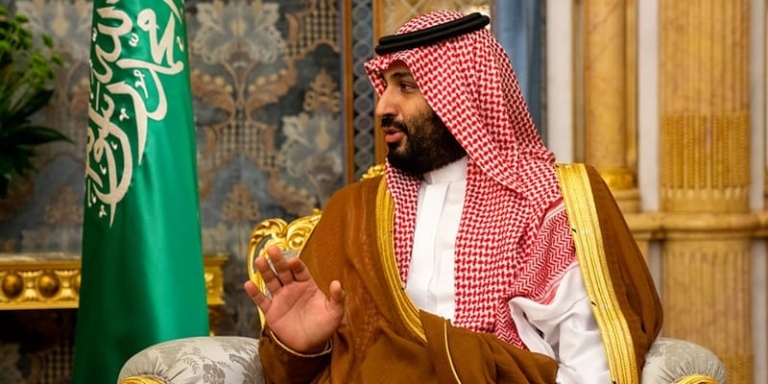
On February 26, the Office of the Director of National Intelligence (ODNI) released its report on the assassination of US resident and Washington Post columnist Jamal Khashoggi in the Saudi Arabian consulate in Istanbul, Turkey, on October 2, 2018. The report implicated Saudi Crown Prince Mohammed bin Salman (MbS) in issuing the order to kill Khashoggi. With the release of the report, the Biden Administration announced the imposition of Magnitsky sanctions against the former deputy director of Saudi General Intelligence, Major General Ahmad al-Asiri, and the Rapid Intervention Force that killed Khashoggi. Secretary of State Antony Blinken established what he called the “Khashoggi Ban,” a visa restriction policy that disallows individuals from entering the United States who carry out directives “that suppress, harass, surveil, threaten, or harm journalists, activists, or other persons.” Family members of these individuals may also be subject to this restriction. Seventy-six people have already been banned.
The release of the report was welcomed in the United States after a delay of more than two years. Former President Donald Trump had suppressed publishing the report despite congressional insistence and legislation to make it available. But the current administration’s response to the clear accusation that MbS was behind Khashoggi’s assassination is considered woefully inadequate since no direct sanctions were imposed on the crown prince himself. Members of Congress, opinion leaders, journalists and media personalities, and the general public demanded, and continue to demand, an appropriate sanction. From its side, the Biden Administration said that while it considers MbS guilty as charged, US-Saudi strategic relations necessitated refraining from sanctioning the crown prince.
Arab Center Washington DC (ACW) asked a group of its fellows and experts to give their opinions of the different repercussions from the release of the ODNI report. Their comments are below.
What Is the Impact on US-Saudi Relations?
Khalil E. Jahshan, Executive Director, ACW
The release of the ODNI report, “Assessing the Saudi Government’s Role in the Killing of Jamal Khashoggi,” unleashed intense and relatively irreconcilable reactions and counterreactions in Riyadh and Washington, signaling what could quickly emerge as the ultimate political crisis in the eight-decade-old bilateral relationship between the two partners. The nature of the report, its contents, and its awkward timing and implementation seem destined to inflict lasting damage to US-Saudi relations at the public and governmental levels alike.
The public reaction in Saudi Arabia was swift and unusually harsh. Traditional Saudi media outlets and social media platforms, although admittedly government controlled to a great extent, reflected the currently widespread populist sentiment in the kingdom characterized by deep anger, shock, and persistent denial at the ODNI report and its political implications. The common Saudi message for both domestic and international consumption was quite clear: “No smoking gun” and “We are all Mohammed bin Salman.” The report, as far as the typical defensive Saudi argument is concerned, and whether emanating from official or non-official sources, is unfair, unjustified, and devoid of convincing and sufficient evidence.
As declared by Abdallah Al-Mouallimi, Saudi Arabia’s UN ambassador, the ODNI assessment failed to present firm evidence. The report, he added, “is based on could’ve, should’ve and would’ve and does not rise to anywhere close to proving the accusation beyond reasonable doubt.” The official Saudi response remains stubbornly unimpressed by arguments to the contrary in Washington—that the purpose of assessment reports by intelligence agencies is not necessarily to indict the accused in a court of law, on the basis of sound and unshakable evidence—insisting instead on the failure of the United States to produce a smoking gun before a Saudi court of law.
In addition, and regardless of its original intended purpose, the report’s conclusion “that Saudi Arabia’s Crown Prince Muhammad bin Salman approved an operation in Istanbul, Turkey to capture or kill Saudi journalist Jamal Khashoggi” was not released carefully and effectively by the Biden Administration. Rather, it added fuel to the fire that is threatening the future of US-Saudi relations. It seems that the moral and political rationale for reaching this assessment by the ODNI and its public dissemination—to punish and propel the Saudi leadership to reach appropriate conclusions and undertake meaningful actions to prevent such crimes in the future—was practically diminished by the rushed and unthoughtful manner in which the report was released. A more orderly release by Washington, accompanied by a clear and detailed strategic vision of the American expectations from the Saudi side, would have saved the administration the embarrassment of being accused of indecisiveness and retreat in the face of criticism at home and abroad. This is in addition to potentially mitigating the significant damage expected to bilateral relations between Washington and Riyadh.
What Message Does the Administration Send to MbS?
Rosie Bsheer, Assistant Professor of History, Harvard University
The ODNI’s February 2021 intelligence report on the Saudi regime’s role in the killing of Jamal Khashoggi confirmed what we already knew from an early CIA investigation, the details of which were leaked to the media in November 2018: that Mohammed bin Salman was culpable for the Saudi journalist’s murder. Yet the announcement itself made the CIA’s assessment the official US government position. This, coupled with candidate Joe Biden’s sanctimonious criticism of the crown prince and of the repressive Saudi regime more broadly during his presidential campaign, raised concerns in Riyadh, where the optics of regime popularity—and of US support in particular—are important. It was also cause for hope among many around the world who prematurely celebrated Biden’s anti-Saudi Arabia bravado and promise to punish Saudi rulers and “make them the pariah that they are.”
As is obvious, Biden has not lived up to his threats, short of freezing some weapons sales to Saudi Arabia and imposing the Khashoggi travel ban. Biden’s threats were quickly tempered once he assumed the presidency by the same foreign policy establishment that has propped up violent regimes around the world. Post-World War II Saudi Arabia is just one among many. Let us set aside the bitter irony of expecting justice for the murder of Khashoggi from a US imperial state that has killed innocent civilians—journalists included—around the world, and with great impunity. To expect a drastic change in US-Saudi relations is to be ignorant of the machinations of US power, especially as it is exerted abroad. It will take more than a botched-up murder of a Saudi citizen to overhaul a decades-old militarized US foreign policy establishment and to risk undoing the political economic ties that bind the two states. The Saudi crown prince is banking on this. He also knows, from previous Saudi rulers, that disagreements between Riyadh and Washington, public or otherwise, rarely translate to forcing Saudi rulers’ hands, let alone to meaningful change.
Long before the ODNI report was declassified, bin Salman learned a valuable lesson. When the unexpected and unprecedentedly negative attention Khashoggi’s murder elicited globally did not translate to serious repercussions for Saudi rulers, the crown prince understood that he simply needed to be more careful, and discreet, in the future. He could not get caught again and make it as difficult for the US government to come to the kingdom’s defense, as it always has. For that, the young MbS is also banking on the passage of time. He cannot be thrilled about the current US posturing and Biden’s attempts to cut him down to size. But time is on the prince’s side. He believes that this, too, shall pass.
What Should the Biden Administration Do?
Sarah Leah Whitson, Executive Director, Democracy for the Arab World Now (DAWN)
The Biden Administration’s response to the ODNI report was not only ineffectual; it was insulting. The administration announced the imposition of sanctions on one more of his underling co-conspirators, Ahmad al-Asiri, as well as his “Rapid Intervention Force.” It established a new visa restriction policy to exclude individuals and their families. But the crown prince himself was not sanctioned despite Biden’s promise, during the presidential campaign in 2020, to make the Saudi regime “pay the price” for human rights abuses and “make them in fact the pariah that they are.”
The claim of Biden officials that MbS will get the message with these new measures that do not touch him is laughable. Even after the Trump Administration sanctioned 17 Saudis, including his right-hand man Saud al-Qahtani, following Khashoggi’s murder, the only message MbS got was that the United States had his back and he could carry on targeting exiles and critics abroad. It was after these sanctions had been applied that the crown prince targeted Palestinian activist Iyad el-Baghdadi and Lebanese journalist Ghada Oueiss. Indeed, a day after the Biden wrist slap, MbS trolls launched an aggressive campaign of attacks, violent threats, and intimidation against this author and her organization, Democracy for the Arab World Now (founded by the slain journalist himself). In addition, a Saudi government-affiliated propagandist produced a nine-minute video falsely claiming that DAWN was not actually founded by Jamal Khashoggi.
Members of Congress and advocacy organizations will continue to push the Biden Administration to do the right thing—sanction MbS and end all weapons sales to Saudi Arabia—if not voluntarily, then mandatorily, pursuant to laws members of Congress will put forth and to court decisions. Two lawsuits remain pending against the administration to force it to disclose all of the information American agencies gathered in connection with this murder, including what and when US officials learned about it. And three lawsuits, including DAWN’s, are pending in US federal district courts against MbS for his crimes, which have already effectively banned him from traveling to the United States. Fear of lawsuits has kept MbS far from Europe as well. On March 2, Reporters Without Borders filed a complaint in Germany against him for crimes against humanity, including the Khashoggi murder. Additional universal jurisdiction suits are likely to follow.
More importantly, to hold MbS accountable for his crimes against Saudi citizens and the Yemeni people as well, King Salman and the Saudi people should replace the crown prince who has proven himself a dangerous liability to Saudi Arabia. The king could advance the interests of his country, including its dignity and reputation, by acting quickly before the nation is stuck with MbS as king for life.
What Message Will Activists and MbS Challengers Get?
Kristian Coates Ulrichsen, ACW Non-Resident Fellow
The long-awaited release by the ODNI report and the lack of strong US measures to hold the Saudi leadership accountable reflect the tension in governing between pragmatism and principle. For all of candidate Joe Biden’s talk during the presidential campaign of making Mohammed bin Salman a “pariah” or of resetting the US-Saudi relationship, now that the Biden team is in government, the calculus has proven quite different. If the Biden Administration is to succeed in bringing an end to the Yemen war, for example, it will need to work closely with MbS and other Saudi leaders on issues that include common interests in regional security and counterterrorism.
By introducing a new policy restricting visas to individuals suspected of targeting dissidents extraterritorially, the administration may hope to put Saudi Arabia (and other countries) on notice that further campaigns against critics will not be tolerated. This may have implications in the cases of other Saudi dissidents––such as former intelligence official Saad al-Jabri in Canada––who claim that they, too, have been the subject of attempts to track them down and return them forcibly to Riyadh. It will be instructive to watch how the case that al-Jabri has filed against Mohammed bin Salman in the US District Court in Washington, DC progresses, not least for any further details that may eventually come to light. Political pressure on the Biden Administration to take tougher action may increase significantly if the targeted harassment of dissidents and critics continues.
While the al-Jabri case became caught up in the power struggle between MbS and his predecessor, former Crown Prince Mohammed bin Nayef, President Biden’s decision to continue to work with Mohammed bin Salman, albeit more at arms-length than the Trump White House did, sends a signal to Riyadh that the current administration will not get involved in internal royal family disputes. This is broadly a reversion to the historical mean after President Trump and key aides such as Jared Kushner appeared to favor one side (Mohammed bin Salman) in the Saudi power struggle over the other, especially in 2017 when MbS became crown prince. With King Salman in uncertain health and aged 85, it is quite likely that MbS will become king during Biden’s term in office, which may have been another factor taken into account in the pragmatic response to the Khashoggi report.
What Response from the Arab World?
Imad K. Harb, Director of Research and Analysis, ACW
Reflecting Saudi Arabia’s pivotal position and role, the Arab world responded with messages of support for the kingdom following the release of the ODNI report. The secretary general of the League of Arab States, Ahmed Aboul Gheit, said that the responsibility for investigating the Khashoggi affair rests with Saudi judicial authorities which should hold people accountable, not with American officials. Gulf Cooperation Council members––Bahrain, Kuwait, Oman, Qatar, and the United Arab Emirates––issued their separate statements in support of Saudi Arabia. So did GCC Secretary General Nayef Al-Hajraf, the Arab Parliament, the Organization of Islamic Cooperation, and the Muslim World League.
It may not be surprising that many in the Arab world are circling the wagons regarding a report that specifically singles out the Saudi crown prince for ordering the murder of a Saudi citizen. This can be attributed to at least two reasons. The first is that Saudi Arabia plays a pivotal role in Arab politics and economic well-being. It is the leader of the de facto Arab political order and, as such, is seen as unassailable. Collective Arab decisions generally cater to Riyadh’s wishes; witness, for example, the Arab silence about reports accusing the kingdom of helping to cause a humanitarian disaster in Yemen. The kingdom’s generous coffers have also been essential for some Arab states, such as Egypt, although the decline in oil revenues may have limited Riyadh’s financial capabilities.
Second, it is not hard to see how Arab states may learn some lessons from the ODNI report regarding their own treatment of dissidents and activists who criticize daily violations of human rights and demand their cessation. There indeed is no doubt that oppressive authoritarians such as Syria’s Bashar al-Assad and Egypt’s Abdel-Fattah el-Sisi see similar reports forthcoming if they were to be implicated in the liquidation of opponents overseas. They may learn that impunity may not always work to protect them, but after the ODNI report, they may not fear serious repercussions since the Biden Administration’s response to MbS’s culpability was so tepid as to lose the intended impact.




